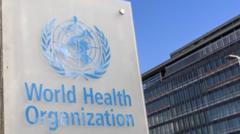President Donald Trump has signed an executive order initiating the process for the United States to withdraw from the World Health Organization (WHO), echoing his earlier stance during the pandemic that the agency mishandled its response to COVID-19. This executive action marks a significant development, as it threatens to reduce US contributions to the WHO's budget by nearly one-fifth—an amount that stood at nearly $1.4 billion in 2023, out of a total budget of $6.8 billion.
US Considers Withdrawal from WHO Again: Implications on Global Health Funding

US Considers Withdrawal from WHO Again: Implications on Global Health Funding
In a move reminiscent of past tensions, President Trump has reignited the possibility of the US exiting the World Health Organization, raising concerns about global health funding and America's role in public health.
Trump emphasized dissatisfaction with the WHO’s handling of various international health crises and criticized its perceived bias towards China during the pandemic. Under previous President Biden's administration, the US remained the largest financial contributor to the organization, but Trump’s recent actions now cast doubt on future funding. The immediate impact of this potential exit raises alarms about the WHO's capabilities in managing health emergencies, such as outbreaks of Ebola or MPOX, and the ongoing fight against infectious diseases like malaria and HIV.
Public health experts have voiced significant concerns regarding the implications of a US withdrawal, suggesting it may hinder global efforts to maintain health standards and worsen disease management. Notably, Ashish Jha, who once coordinated the US's COVID-19 response under Biden, stated that a withdrawal could detrimentally affect both global health strategies and American public health ventures. Lawrence Gostin, a Georgetown University professor specializing in public health, labeled the decision as a "grievous wound" to global health and US credibility.
While some propose that a withdrawal could push for reforms within the WHO, the prevailing sentiment in Washington indicates that Trump's determination to pull out may not be reconsidered this time. Observers worry that this could potentially increase China's influence within the organization, further complicating the dynamics of international health governance. As this situation unfolds, one thing remains clear: the future of US involvement in the WHO is once again under serious review, with far-reaching consequences for global health initiatives.
Public health experts have voiced significant concerns regarding the implications of a US withdrawal, suggesting it may hinder global efforts to maintain health standards and worsen disease management. Notably, Ashish Jha, who once coordinated the US's COVID-19 response under Biden, stated that a withdrawal could detrimentally affect both global health strategies and American public health ventures. Lawrence Gostin, a Georgetown University professor specializing in public health, labeled the decision as a "grievous wound" to global health and US credibility.
While some propose that a withdrawal could push for reforms within the WHO, the prevailing sentiment in Washington indicates that Trump's determination to pull out may not be reconsidered this time. Observers worry that this could potentially increase China's influence within the organization, further complicating the dynamics of international health governance. As this situation unfolds, one thing remains clear: the future of US involvement in the WHO is once again under serious review, with far-reaching consequences for global health initiatives.






















